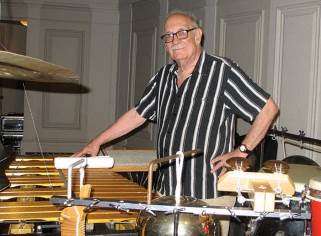|
Back
An Important and Distinctive Composer New York
National Sawdust
10/28/2019 -
Vox Hominis
Zac Nicholson (director), Open G Records & National Sawdust (producers)
George Crumb: Sun and Shadow (Spanish Songbook II) [1] – Celestial Mechanics (Makrokosmos IV) [2] – Mondus Canis [3] – Night of the Four Moons [4]
Sharon Harms [1, 4] (soprano), Christopher Chaffee [4] (alto flute, piccolo), Christopher Orosa [4], Steven Beck [1], Xak Bjorken [2], James Primosch [2] (piano), Richard Valltutto [2] (page turner), Oren Feder (guitar [3], banjo [4]), James Baker [3, 4] (percussion)

G. Crumb (© Courtesy National Sawdust)
George Crumb’s 90th birthday was celebrated at National Sawdust, a leading venue for new music in New York. Recently renovated by Meyer Sound Systems, 103 speakers project sounds from the heavily microphoned room. Clear differences are evident between even subtly diverging tones.
Crumb is a composer who always has gone his own way. From the moment he puts pen to paper to indicate notes that medieval scribes might have laboriously inked, interpreting musicians dig in to realize snail-like circles and thick repetitions among many often impish suggestions. This is Augenmusik and was illustrated in a recent film about Crumb made by Zac Nicholson which began the concert.
Impish is a good word for this very serious artist. He delights in paying tribute to five dogs in his life in Mondus Canis. This set of five portraits for guitar (Oren Fader) and percussion (James Baker), introduces us to Tammy, who prowls about the yard, and Yoda, whose misbehavior leads to a concluding guttural, “Bad dog”, from Baker.
Often the instrumentalists are called upon as vocalists. The superb soprano Sharon Harms struck a small bell. Roles are upended to the apparent pleasure of both the artists and audience.
The evening began with Ms. Harms singing Sun and Shadow based on García Lorca poems translated to English. Crumb has held García Lorca close for his entire compositional career. Crumb points out that the songs range from whimsical to elegiac. He also notes the demands made on the singer: “I have tried to translate the poet’s vivid and intense imagery into an equally potent musical idiom... In addition to the normal bel canto, the singer must (speak).” Passages are sometimes whispered. Humming and glissando effects also emerge. The pianist must extend the use of his instrument. Pizzicato effects are deployed. The piano is muted and special pedal effects accompany the strike of a metal crossbeam by a percussionist’s yarn stick.
The piano as hybrid between solo instrument and orchestra is further explored in Celestial Mechanics. Cosmic dances composed in a fantastic style rollick across the room. At one point, the page turner joins to provide six hands and further amplify the sound. For all of Crumb’s playfulness, his work is often majestic, suggesting a procession of the stars extending from first to fourth magnitude.
Crumb is an important and distinctive composer. His fastidious ear governs the music we hear and gives shape and pleasure to the listener. The evening gave us a taste of his various preoccupations: the human voice extended and so too the piano. His palette is unique and particular. Evocative theatrical elements abound.
Susan Hall
|